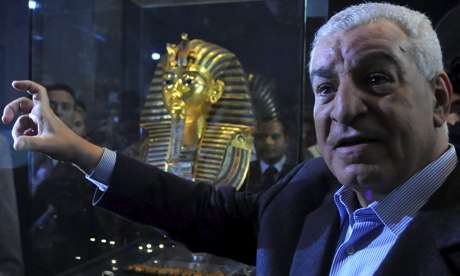
Zahi Hawass says that if he were to return to office he would renew calls for the repatriation of the Rosetta Stone. Photograph: Karam Nasser/APA/Rex
Archaeologist and former antiquities minister says rise of army leader mirrors ascent of Mentuhotep II 4,000 years ago
"When Mohamed Morsi became the second Egyptian president to be ousted in three years in July, many felt history was repeating itself. ForZahi Hawass, a flamboyant antiquities minister under Hosni Mubarak, that feeling was particularly acute – though he was thinking of a much older precedent.
For him, the move by the army chief Abdel Fatah al-Sisi evoked memories not just of his old boss's ignominious exit but the rise to power of the pharaoh Mentuhotep II, who took charge of Egypt about 4,150 years ago.
"In my opinion, Sisi is really Mentuhotep II," said Hawass. "You need to understand what happened 4,000 years ago to understand what is happening now."
In Hawass's view, the upheaval Egypt has experienced since 2011 mirrors the century of chaos that preceded Mentuhotep's accession to the Egyptian throne in 2046BC. Mentuhotep restored order to Egypt – much as Hawass argues Sisi is about to do today. "We need an elected officer – a strong man – to control the country. And in my opinion, Sisi is our only hope."
Hawass is particularly hopeful about Sisi's rise, perhaps because it has come hand-in-hand with the rehabilitation of many of those who – like Hawass – were once tainted by their association with Mubarak. Under the former president, Hawass became something of an international celebrity, starring in his own reality series and putting his name to a line of khaki trousers. But when Mubarak fell, Hawass hung on to his position for a few months, before leaving under a cloud of unproved corruption allegations – an obvious target for public anger.
Now Hawass is back on Egypt's payroll, as an ambassador for the country's tourism ministry. Almost unthinkable a year ago, he is even angling for a return to his old job as antiquities minister – once a permanent government is installed – and claims to have widespread backing from ministry officials.
"I can't come back under a temporary government," said Hawass. "But I would like to come back to finish this. Twenty-thousand people signed a petition asking me to come back. Young people come to me now crying, because they cannot excavate like in the past."
Whether people really do come to him in tears is a moot point – while in office, his critics resented what they saw as his favouritism, and say he took too much credit for other's finds. But Egypt's archaeological lands have certainly come under extreme threat since Hawass's time.
After police downed tools amid the breakdown of law and order that followed Mubarak's exit, looters and rogue builders moved in on several antiquities sites across Egypt, causing substantial damage.
In one well-documented land-grab, locals seized several acres next to the Dahshur pyramids, just south of Cairo, and built an illegal cemetery – a problem mirrored in several places across the country. "What is happening to antiquities now is a crime. There are illegal excavations everywhere all over Egypt," said Hawass, who estimates more than 30% of Egypt's ancient sites may have been damaged, an unverifiable figure nevertheless echoed by others in the field. "People can do anything," he added.
There are plenty of archaeologists sounding the alarm and proposing solutions – but for Hawass, there is naturally only one man to lead the fightback. "It's a gift from god," said Hawass of his talent for administration, which his supporters say brought both higher revenues and greater ambition to the antiquities ministry. "I have a vision. But the people in charge now do not have one."
According to his own folklore, only Hawass has the clout to repatriate ancient Egyptian artefacts sitting in museums overseas. Under his hypothetical new ministership, Hawass would renew calls for the return of the British Museum's Rosetta Stone, the ornate slab of rock that holds the key to many hieroglyphics. "The British Museum did lots of good work for Egypt," Hawass said. "But the Rosetta Stone represents the identity of Egyptian antiquities, and it should be in Egypt."
Hawass has a gift for self-promotion – he is currently promoting his latest book, Discovering Tutankhamun – but he rejects the criticism that as minister he took credit for the work of other people. He also says he never had favourites and argues that those ministry officials whose careers he supported above others where chosen on qualifications only.
In 2013 Hawass was accused of giving US magazine National Geographic special access to pyramid sites, in exchange for large payments. But on this, and all other suggestions of corruption, Hawass insists his innocence: "When 20 people made accusations against me, there was nothing. Because I was clean and I never break the law in my life," he said.
In short, Hawass feels he has little to apologise for and if he does ever return in triumph he will never need to. Even his 11th-hour defence of Mubarak in 2011, who Hawass said should stay to oversee an orderly transition of power, was in his view the right thing to do.
If there is one fault he will own up to, it is his ego – not that it is, in the Hawassian worldview, necessarily a flaw.
"When I talk people listen to me, when [others] talk people sleep," he said. "I don't see why people criticise me about this. I made Egypt in the hearts of everyone everywhere. Before, only foreigners used to do that. I went to England, and I got in a lift, and a lady fainted when she saw me. She could not believe that I was in her hotel. What can I do?"

No comments:
Post a Comment